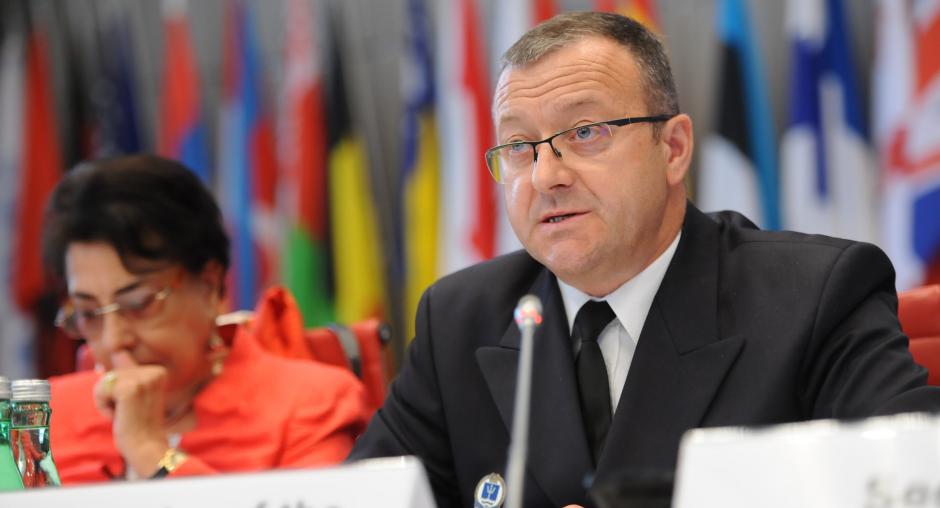Security in Mediterranean region focus of joint meeting of Forum for Security Co-operation and Permanent Council

VIENNA, 11 July 2018 –The security situation in the Mediterranean region was a key area of focus at today's joint meeting of the OSCE Forum for Security Co-operation and the Permanent Council in light of large movements of refugees and migrants.
Opening the meeting, Ambassador Andrej Benedejčič, the Permanent Representative of Slovenia to the OSCE and Chairperson of the Forum for Security Co-operation, said that the aim of the joint meeting was to bring greater attention to challenges emanating from the Mediterranean basin. "The OSCE has a unique capability to address such challenges with its cross-dimensional approach to security. This kind of holistic strategy was already approved by the OSCE Ministerial Council Decision on Migration in Ljubljana in 2005, during the Slovenian OSCE Chairmanship."
Ambassador Alessandro Azzoni, the Permanent Representative of Italy to the OSCE and Chairperson of the Permanent Council, underlined that the topic could not be more fitting for the 2018 Italian OSCE Chairmanship. He said that recent challenges have once again highlighted the interconnected nature of security in Europe and the need to amplify contacts and dialogue among all the states of the Mediterranean.
“The fight against human trafficking and smuggling of migrants is an important element in shaping a co-ordinated and comprehensive response to the broader challenge of migration,” said Azzoni. He also noted that this is one area where the OSCE contributes, for example, by organizing the simulation training programme jointly conducted by the OSCE and the Carabinieri of the Center of Excellence for Stability Police Units in Vicenza.
Captain Ettore Socci, the Military Adviser to the Commander of EUNAVFOR MED, explained that EUNAVFOR MED – Operation Sophia, the biggest operation under the EU Common Security and Defence Policy, is one part of the EU’s efforts to address migration and support the return of stability to Libya. The operation's main goal is to disrupt the business model of human trafficking, he said.
“Since July 2017, irregular migration from Libya to Europe has been reduced. The situation needs monitoring, but it shows that through an integrated approach the smugglers’ business model can be broken,” said Socci, adding that EUNAVFOR MED is working toward enhancing the exchange information with a number of organizations, including the African Union, the International Criminal Court, INTERPOL, EUROPOL, UNODC and the OSCE.
Slovenia is one of the original contributing states to Operation Sophia. Captain Boris Geršak, Commander of the Slovenian Naval Force, said: “The Mediterranean has become an area of extreme insecurity, with potentially far-reaching consequences for the states in the region." He emphasized the need for strengthening regional co-operation and highlighted the example of the Adriatic–Ionian Initiative (ADRION), which unites navies from Italy, Greece, Albania, Croatia, Montenegro and Slovenia.
The joint meeting of the OSCE Forum for Security Co-operation and Permanent Council was also addressed by Assia Bensalah Alaoui, Ambassador-at-Large of his Majesty Mohamed VI, the King of Morocco. She said that “polarized societies are an obstacle to dialogue and inclusion, and that women are often the first victims of insecurity.”
Bensalah Alaoui emphasized that a balanced approach and attracting the badly needed investments remain of key importance for the stabilization of the region. She said that the security approach or one-size-fits-all solution alone to such complex issues cannot address properly the question of migration. “Root factors, such as ill development, corruption, bad governance and massive unemployment have to be addressed, in order to offer to Maghreb and African youth other choices than joining organized crime networks and jihadist groups or emigrating to survive,” she said. She concluded by emphasizing the need for a new paradigm and a comprehensive approach when it comes to the security of the Mediterranean region.
